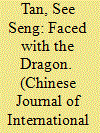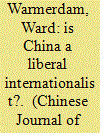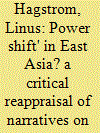|
|
|
Sort Order |
|
|
|
Items / Page
|
|
|
|
|
|
|
| Srl | Item |
| 1 |
ID:
119243


|
|
|
|
|
| Publication |
2012.
|
| Summary/Abstract |
How Asian countries relate strategically with rising China remains one of the most debated questions in Asian security today. Although the concomitant rise of regional powers (China, Japan, and India) has undoubtedly shaped, and continues to shape, the geopolitical milieu of post-Cold War Asia, it is the perceived emergence of China as an economic and military power that has nonetheless engendered most concern among Asian countries, not least Singapore. Analysts, however, disagree over how Asians perceive and respond to China's rise. One view, for example, has it that Asian countries have opted to bandwagon with China (as vassal states once did with imperial China);1 another that Asian states on the whole have demonstrated a greater inclination towards balancing China.2 A third view adopts the via media in suggesting that aspects of both bandwagoning and balancing can in fact be discerned in the behaviour of Asian states.3 Smaller and/or weaker Asian countries accordingly 'hedge'4 against China and other major powers as they manage their respective vulnerabilities and dependencies vis-à-vis those more powerful than they.5
|
|
|
|
|
|
|
|
|
|
|
|
|
|
|
|
| 2 |
ID:
119242


|
|
|
|
|
| Publication |
2012.
|
| Summary/Abstract |
China has been accused of many things with respect to its engagement with the developing world, especially with Africa. They include being driven by thirst for oil and natural resources,1 neglecting human rights offences in recipient nations,2 supporting, directly or indirectly, corrupt authoritarian regimes and dictators,3 and undermining Western efforts in these countries to promote good governance,4 maintain debt sustainability5 and improve governance and social welfare.6 China, on the other hand, argues that its engagement with the developing world is one based on mutual benefit7 and a respect for national sovereignty,8 which both China and its partners regard as an alternative to dominant Western models of development for developing nations.
|
|
|
|
|
|
|
|
|
|
|
|
|
|
|
|
| 3 |
ID:
119245


|
|
|
|
|
| Publication |
2012.
|
| Summary/Abstract |
Uncertainty, or incomplete information, is a fundamental fact that makes life interestingly frustrating and frustratingly interesting. Not surprisingly, uncertainty has occupied a central place in social sciences, including international politics.1
In international relations (IR), uncertainty is not just a theoretical jargon that lumps together our ignorance. Rather, uncertainty underpins a pressing and enduring challenge for statesmen and students of IR-the challenge of understanding the (immediate and deeper) causes behind other states' behavior (and non-behavior). While statesmen tend to rely on some gut feeling to gauge the forces behind other states' moves, students of IR have tried to import the social psychology literature on attribution to build a framework for understanding other states' behavior. Unfortunately, the social psychology literature on attribution provides only limited mileages for addressing uncertainty in IR. As a result, existing discussion on attribution in IR suffers from some crippling deficiencies.
|
|
|
|
|
|
|
|
|
|
|
|
|
|
|
|
| 4 |
ID:
119244


|
|
|
|
|
| Publication |
2012.
|
| Summary/Abstract |
Great symbolic value has been invested in the incident between Japan and the People's Republic of China (PRC, China) that began in waters surrounding the disputed Diaoyu/Senkaku Islands on September 7, 2010.1 Although several distinct narratives on the incident have appeared, the leading one essentially interprets its process and fallout as (further) evidence of an ongoing 'power shift' in East Asia, or explains it as a consequence of such a 'power shift'.2 In this instance, Chinese 'aggressiveness' or 'pressure', and Japanese 'weakness' or 'defeat' are viewed respectively as reflections of 'China's rise' and 'Japan's decline'.
|
|
|
|
|
|
|
|
|
|
|
|
|
|
|
|
|
|
|
|
|